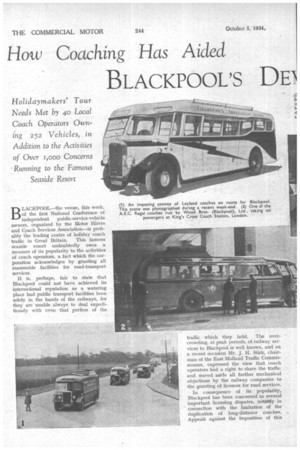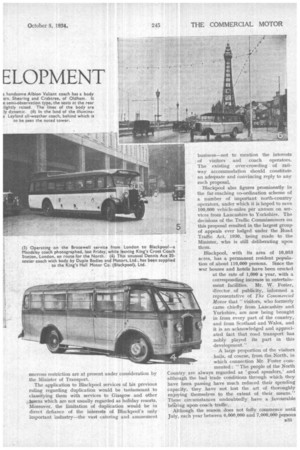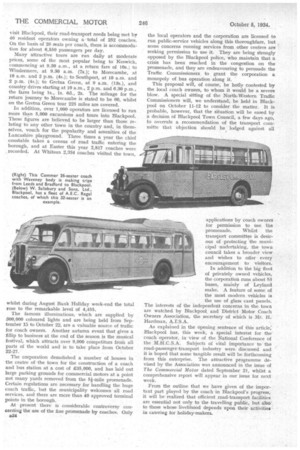How Coaching Has Aided
Page 50

Page 51

Page 52

If you've noticed an error in this article please click here to report it so we can fix it.
BLACKPOOL'S D
ELOPMENT
Holidaymakers' Tour Needs Met by 40 Local Coach Operators Own.ing 252 Vehicles, in Addition to the Activities of Over r,000 Concerns Running to the Famous Seaside Resort BLACKPOOL—the venue, this week, of the first National Conference of
independent public-service-vehicle owners, organized by the Motor Hirers and Coach Services Association—is probably the leading centre of holiday coach traffic in Great Britain. This famous seaside resort undoubtedly owes a measure of its popularity to the activities of coach operators, a fact which the corporation acknowledges by granting all reasonable facilities for road-transport services. It is, perhaps, fair to state that Blackpool could not have achieved its international reputation as a waterin,g place had public transport facilities been solely in the hands of the railways, for they are unable always to deal expeditiously with even that portion of the
traffic which they. hold. The overcrowding, at peak periods, of railway services to Blackpool is well known, and on a recent Occasion Mr. J. H. Stirk, chairman of the East Midland Traffic Commissioners, expressed the view that coach operators had a right to share the traffic and waved aside all further mechanical objections by the railway companies to the granting of licences for road services.
In consequence of its popularity, Blackpool has been concerned in several important licensing disputes, notably in connection with the limitation of the duplication of long-distance coaches. Appeals against the imposition of this
onerous restriction are at present under consideration by the Minister of Transport.
The application to Blackpool services of his previous ruling regarding duplication would be tantamount to classifying them with services to Glasgow and other „towns which are not usually regarded as holiday resorts. Moreover, the limitation of duplication would be in direct defiance of the interests of Blackpool's only important industry—the vast catering and amusement business—not to mention the interests of visitors and coach operators. The existing over-crowding of railway accommodation should constitute an adequate and convincing reply to any such proposal.
Blackpool also figures prominently in the far-reaching co-ordination scheme of a number of important north-country operators, under which it is hoped to save 100,000 vehicle-miles per annum on services from Lancashire to Yorkshire. The
decisions of the Traffic Commissioners on
1 this proposal resulted in the largest group of appeals ever lodged under the Road Traffic Act, 1930, being made to the Minister, who is still deliberating upon them.
Blackpool, with its area of 10,053 acres, has a permanent resident population of about 110,000 persons. Since the war houses and hotels have been erected at the rate of 1,000 a year, with a corresponding increase in entertainment facilities. Mr. W. Foster, director of publicity, informed a representative of The Commercial Motor that "visitors, who formerly came chiefly from Lancashire and Yorkshire, are now being brought in from every part of the country, and from Scotland and Wales, and it is an acknowledged and appreciated fact that road transport has nobly played its part in this development."
A large proportion of the visitors hails, of course, from the North, in which connection Mr. Foster commented: " The people of the North Country are always regarded as 'good spenders,' and although the bad trade conditions through which they have been passing have much reduced their spending capacity, they have not lost the art of thoroughly enjoying themselves to the extent of their means." These circumstances undoubtedly have a favourable baring upon coach traffic.
Although the season does not fully commence until July, each year between 6,000,000 and 7,000,000 Persons B33 visit Blackpool, their road-transport needs being met by 40 resident operators owning atotal of 252 coaches. On the basis of 26 seats per coach, there is accommodation for about 6,550 passengers per day.
Many attractive tours are run daily at moderate prices, some of the most popular being to Keswick, commencing at 9.30 a.m., at a return fare of 10s.; to Windermere, at 9.30 a.m. (7s.); to Morecambe, at 10 a.m. and 2 p.m. (4s.); to Southport, at 10 a.m. and 2 p.m. (4s.); to Gretna Green, at 9 a.m. (13s.), and country drives starting at 10 a.m., 2 p.m. and 6.30 p.m., the fares being Is., Is. 6d., 2s. The mileage for the return journey to Morecambe is stated to be 60, whilst on the Gretna Green tour 225 miles are covered.
In addition, over 1,000 operators are licensed to run more than 5,000 excursions and tours into Blackpool. These figures are believed to be larger than those relating to any other town in the country and, in themselves, vouch for the popularity and amenities of the Lancashire playground. Three times a year the chief constable takes a census of road traffic entering the borough, and at Easter this year 2,817 coaches were recorded. At Whitsun 2,334 coaches visited the town, whilst during August Bank Holiday week-end the total rose to the remarkable level of 4,455.
The famous illuminations, which are supplied by 300,000 coloured lights and are being held from September 15 to October 22, are a valuable source of traffic for coach owners. Another autumn event that gives a fillip to business at the end of the season is the musical festival; which attracts over 9,000 competitors froth all parts of the world and is to take place from October 22-27.
The corporation demolished a number of houses in the centre of the town for the construction of a coach and bus station at a cost of £35,000, and has laid out large parking grounds for commercial motors at a point not many yards removed from the *mile promenade. Certain regulations are necessary for handling the huge coach traffic, but the municipality welcomes all road services, and there are more than 40 approved terminal points in the borough.
At present there is considerable controversy concerning the use of the fine promenade by coaches. Only n.34 the local operators and the corporation are licensed to run public-service vehicles along this thoroughfare, but some concerns running services from other centres are seeking permission to use it. They are being strongly opposed by the Blackpool police, who maintain that a crisis has been reached in the congestion on the promenade, and they are endeavouring to persuade the Traffic Commissioners to grant the corporation a monopoly of bus operation along it.
This proposal will, of course, be hotly contested by the local coach owners, to whom it would be a severe blow. A special sitting of the North-Western Traffic Commissioners will, we understand, be held in Blackpool on October 11-12 to consider the matter. It is probable, however, that the situation will be eased by a decision of Blackpool Town Council, a few days ago, to overrule a recommendation of the transport coin7 mitte that objection should be lodged against all
applications by coach owners for permission to use the promenade. Whilst the transport committee is desirous of protecting the municipal undertaking, the town council takes a broader view and wishes to •offer every encouragement to visitors.
In addition to the big fleet of privately owned vehicles, the corporation runs about 55 buses, mainly of Leyland make. A feature of some of the most modern vehicles is the use of glass cant panels. The interests of the independent concerns in the town are watched by Blackpool and District Motor Coach Owners Association, the secretary of which is Mr. H. Hardman, A.I.S.A.
As explained in the opening sentence of this article; Blackpool has, this week, a special interest for the coach operator, in view of the National Conference of the M.H.C.S.A. Subjects of vital importance to the road-passenger-transport industry were discussed and ' it is hoped that some tangible result will be forthcoming from this enterprise. The attractive programme devised by the Association was announced in the issue of The Commercial Motor dated September 21, whilst a comprehensive report will appear in our issue for next week. • From the outline that we have given of the important part played by the coach in Blackpool's progress, it will be realized that efficient road-transport facilities are essential not only to the travelling public, but also to those whose livelihood depends upon their activities in catering for holiday-makers.




































































































